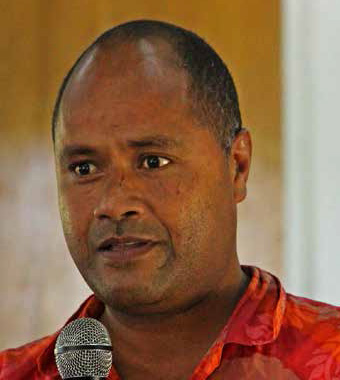 Bringing farmers together to talk about the technical side of farming is pretty easy in the Pacific. Farmers want to talk to each other and learn from each other. The success of farmer-tofarmer learning exchanges is testament to this.
Bringing farmers together to talk about the technical side of farming is pretty easy in the Pacific. Farmers want to talk to each other and learn from each other. The success of farmer-tofarmer learning exchanges is testament to this.
Bringing farmers together to talk about issues and policy is a little bit harder and sometimes involves a bit of arm-twisting. It was, however, one of the only requirements of the programme that really didn’t fit with how farmer organisations in the Pacific region saw themselves. So, when the project that is funding the other great work that you are doing demands that you meet and develop a national platform – that is what you do.
In Fiji, when the invitations to attend the Fiji Farmers Forum (the first ever national Farmers Forum in Fiji) went out, many of the farmer organisations were reluctant to attend. They saw themselves as local organisations, working locally with their farmers and couldn’t really see the point of coming together with other farmer organisations from other parts of the country. What could a dalo farmer from the island of Taveuni have in common with a dairy farmer from the interior of Naitasiri?
Yet, in August 2017 approximately 50 participants from farmer organisations across the Fiji agricultural sector, the Fiji Ministry of Agriculture, and various NGO and development partners came together for two days to highlight the opportunities and constraints facing their members and to provide solutions for consideration to policy makers. The Fiji Crop and Livestock Council hosted the event and by the end of the two days many participants had changed their views on the value of having a national platform to raise farmers’ voices.
Direct access to government officials was only one of the benefits, enabling the participants to not only learn about the various government programs and policies already in existence and how they might be able to make use of them, they had also been able to provide their own inputs into what was and wasn’t working and make suggestions on how these programs and policies could be improved.
Perhaps considered even more useful (and unexpected for many of the participants), was finding out that many of the local issues affecting farmer organisations and their members were the same across the country and across the different commodities – that the dalo farmer on the island of Taveuni and the dairy farmer from the interior of Naitasiri did have things in common after all. A shared understanding of issues and solutions enabled the Fiji Farmers Forum to issue a Farmers Communiqué at the end of the Forum and present it directly to the Government as the combined voice of over 30,000 Fiji farmers.
Further this understanding that farmers’ issues were shared across the country and that by working together and presenting a unified ‘farmers’ voice Government would be more likely to listen has heralded a new era in cooperation between farmer organisations in Fiji and coordination in their representation to influence policy.
